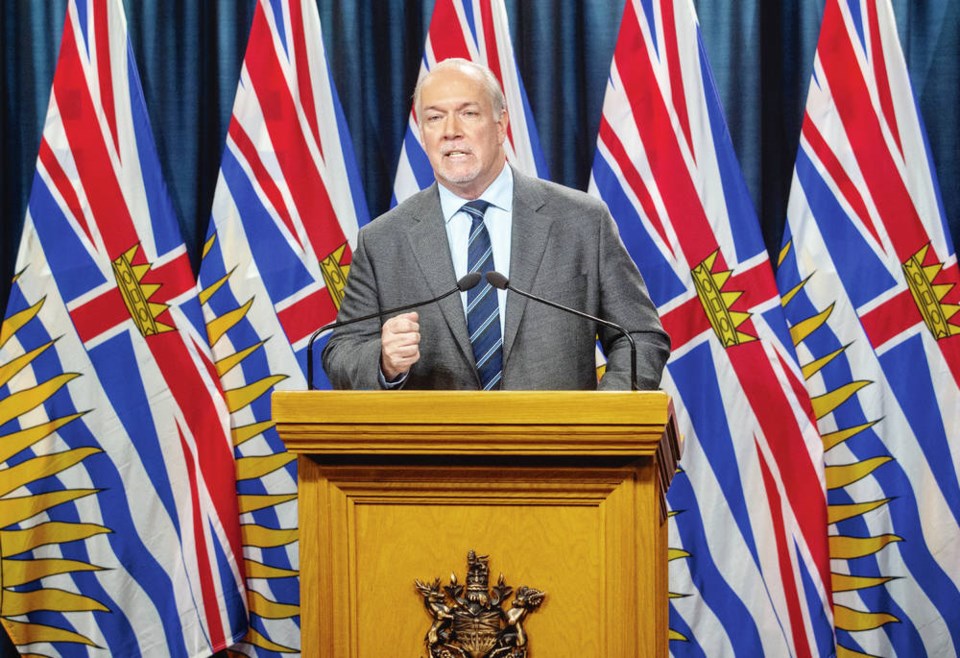As COVID-19 cases in the province spike, Premier John Horgan said Wednesday that non-essential travel is prohibited in B.C. for the next two weeks at least.
“If you don’t need to travel, don’t travel,” said Horgan. “This is not the time to go storm watching on the west coast of Vancouver Island. This is not the time to plan for a large gathering of friends over the Christmas holiday.”
On Wednesday, the Health Ministry announced a record-breaking 762 new cases of COVID-19 across the province — only the second day with a daily count above 700 — and 10 more deaths, for a total of 320 to date. It’s a count that’s “unacceptably high,” the premier said.
Twenty new cases were announced for the Island Health region, the highest daily count so far. There are 118 active cases on the Island — 31 in the south, 71 in the central Island, and 16 in the north.
Despite regional health orders issued on Nov. 9 restricting travelling and socializing in the Fraser and Vancouver Coastal health regions, where the majority of new cases are, case numbers have continued to rise.
Horgan said B.C. residents need to focus on limiting gatherings and restricting travel for the next couple of weeks. He hinted that more orders and restrictions will be coming Thursday from provincial health officer Dr. Bonnie Henry, who is expected to address masks, social gatherings, travel and schools at her 3 p.m. media conference.
Vancouver Island chief medical health officer Richard Stanwick has floated the idea of an Island bubble where non-essential travellers coming here would be ordered to quarantine for 14 days, much like in the Maritime provinces’ “Atlantic bubble.”
Stanwick said 66 of 133 COVID-19 cases on the Island between Sept. 1 and Nov. 10 came from travel off the Island. Twenty people came from other parts of B.C. to the Island “and they brought COVID with them and managed to pass it to 11 Islanders, who then passed it on to four more Islanders.”
With 94 new cases in Island Health since Friday, “we need to see how can we at least stabilize that number and then drive it down, because our contract tracers are working flat out,” Stanwick said.
Horgan said he will leave the decision on the “Atlantic bubble” to Henry, but noted that it “may not be the best way forward.” While the Maritime bubble proved successful, we “don’t have the ability to do that — we have large borders.”
“There are a lot of people that live in British Columbia, work in Alberta, [or] live in Alberta [and] work in British Columbia.”
The premier said he plans to contact the prime minister and advocate a pan-Canadian approach to discouraging non-essential travel.
“I’m encouraging the prime minister to take this opportunity to work with all of us — and I’m confident that he will — to say broadly to all Canadians: Stay where you live, reduce your social interactions, do only those things that are essential to you and your family and your business and your employment, and other than that, stay tight, stay focused on bending the curve.”
Horgan said it’s important to ensure people in Coquitlam are living under the same rules as those in Chicoutimi, Que. “We need to make sure that those who want to come to British Columbia must only do so if it is essential for their business or their well being. Beyond that, we need to stay in our tight, social circles.”
The premier said when he speaks with the prime minister, he plans to bring up the Transport Canada edict that prohibits ferry travellers on lower decks from remaining in their vehicles during the voyage.
“I believe that B.C. Ferries can come up with strategies to keep people safe,” said Horgan, including having more employees on the car deck in the event there is a need to evacuate. “We’ve talked to B.C. Ferries about that, we’ve talked to Transport Canada about that, and I’ll continue to push this.”
Across the province, there are now 6,861 active COVID-19 cases, with 209 in hospital, including 58 in intensive care.
The majority of the new cases in Fraser and Vancouver Coastal health regions come from social gatherings, as well as some fitness classes. Horgan said Henry will have “more to say” about gyms and other businesses on Thursday, including new orders.
With pockets of outbreaks in B.C. schools, including those in the Nanaimo-Ladysmith School District, “troubleshooters” have been going through the kindergarten to Grade 12 system to ensure the province can respond to changing circumstances, he said.
Vaccines for COVID-19 are promising, “but we’re not there yet,” said Horgan. “We cannot lose our resolve now. We have to redouble our efforts to protect each other in our province going forward.”



